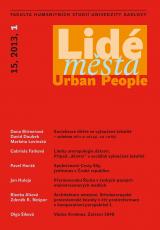Socializace dítěte ve vyloučené lokalitě
Schéma děti si dělají, co chtějí
DOI:
https://doi.org/10.14712/12128112.3486Klíčová slova:
socialization, education, Roma, exclusion, qualitative research, cognitive anthropologyAbstrakt
In our qualitative study, we would like to address the existing interpretation of the socialization of children from excluded localities. Theoretically, we start from the concept of cultural models (the cognitive anthropological approach). In our study, we explore shared opinion - the schema that children do whatever they want. We would like to show that the benevolence of Roma parents is not an expression of their upbringing and of their resignation on education, but that it stems from the different structures of the schema. The main issue is the confrontation of the schemata related to the concept of childhood and the education of socially excluded people and of the majority. The key concept is the relation between the need for discipline (the majority position, Foucault) and the respect and apprehension for children (the position of excluded people). During the modernization process, the majority accepted that the aim of socialization is to produce a "universal", flexible individual with compatible cultural knowledge. Conversely, the aim of socialization among excluded families is to produce a respectable community member their own measures. Punishment is not a tool of discipline, but a means of communication, which expresses something about the relationships between the punisher and the punished. Parental and adult authority is absolute in a certain way, but it does not assert itself during the process of discipline - parents are respected, but they do not transform their own position into the tool of the child's oppression. The idea of teaching is missing here, and is substituted by the schema's gradual coping with things. In excluded localities, coping means gaining composure. In the network of schemata, the concept of gaining composure contributes to the schema that children do whatever they want. Parents can gain composure when they leave their children to do what they want to do. This does not mean, however, that this schema causes chaos in the process of socialization in an excluded locality. In fact, the schema children do whatever they want prepares them to practically and psychically manage their lives in exclusion.
Stahování
Publikováno
Jak citovat
Číslo
Sekce
Licence

Tato práce je licencována pod Mezinárodní licencí Creative Commons Attribution-NonCommercial-NoDerivatives 4.0.


